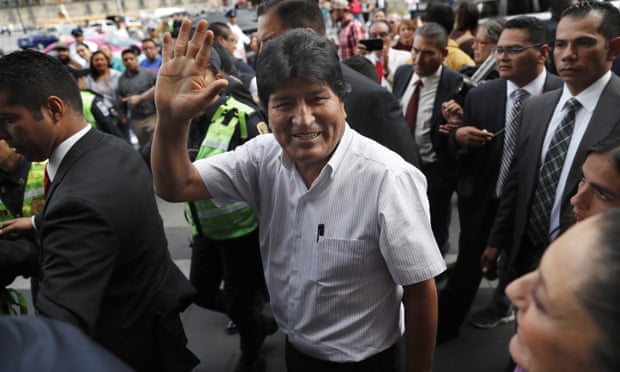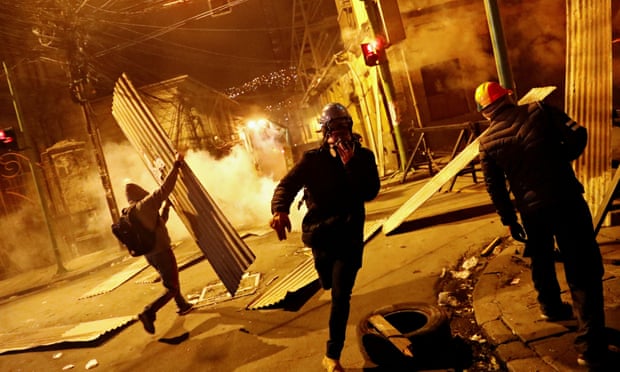- UID
- 20
- Online time
- Hours
- Posts
- Reg time
- 24-8-2017
- Last login
- 1-1-1970
|
|
━━━━━━━━━━━━━━━━━
With protests growing in La Paz, the future of the country Evo Morales reshaped is in doubt.

Bolivia’s former president Evo Morales arrives in Mexico last week after the country granted him asylum following his resignation. Photograph: Marco Ugarte/AP
▼ On one side of Bolivia’s political chasm people and leaders are denouncing a “coup”. On the other, they are welcoming the “return of democracy”. The dispute over what is happening in Boliviahas spilled far beyond the country’s borders, fought over by allies and critics around the world.
But the most intense battles are playing out on the streets where the crisis began just a few weeks ago, now more volatile than ever, as protesters on both sides say they are fighting for the soul and future of their country.
After weeks of escalating demonstrations over contested election results, which saw police mutiny, trade union allies desert him and then the military call for his departure, President Evo Morales submitted his resignationand fled the country.
But his departure, far from resolving Bolivia’s crisis, has only deepened it. After his allies in the legislature resigned, the next in the line of succession was a rightwing Christian who served as deputy president of the senate, Jeanine Áñez.
She seized the position of interim presidentwith alacrity, naming a new cabinet, declaring “the Bible has re-entered the palace” while brandishing a hefty copy of the book, and warning Morales he could face prosecution if he returned to Bolivia.

Protestors in the Bolivian city of La Paz as both sides say they are fighting for ‘the soul and future’ of their company. Photograph: Kai Pfaffenbach/Reuters
Her chief responsibility as temporary leader though is organising new elections within 90 days, and for this she has shown only limited enthusiasm. On Thursday, politicians from Morales’s party and the interim government said they had struck a deal to pave the way for a new vote in 90 days. But on Friday Áñez said that deal had failed, without providing further explanation.
On the streets, protests have continued, with Morales supporters attacking heavy-handed policing, accusing authorities and opponents of targeting them for being indigenous in appearance or dress.
Clashes had resulted in at least five deaths by yesterday. Guadalberto Lara, the director of the Mexico hospital, said most of the dead were in Sacaba, in the centre of the country, and dozens more had been shot and injured. Witnesses said police opened fire on protesters, who were calling for the return of Morales from exile in Mexico.
“It’s very unfortunate,” Lara said, calling it the worst violence he had seen in his 30-year career.
Tensions were inflamed by attacks on the Wiphala, the flag of the (▪ ▪ ▪)
► Please, continue reading this article here: Source |
|